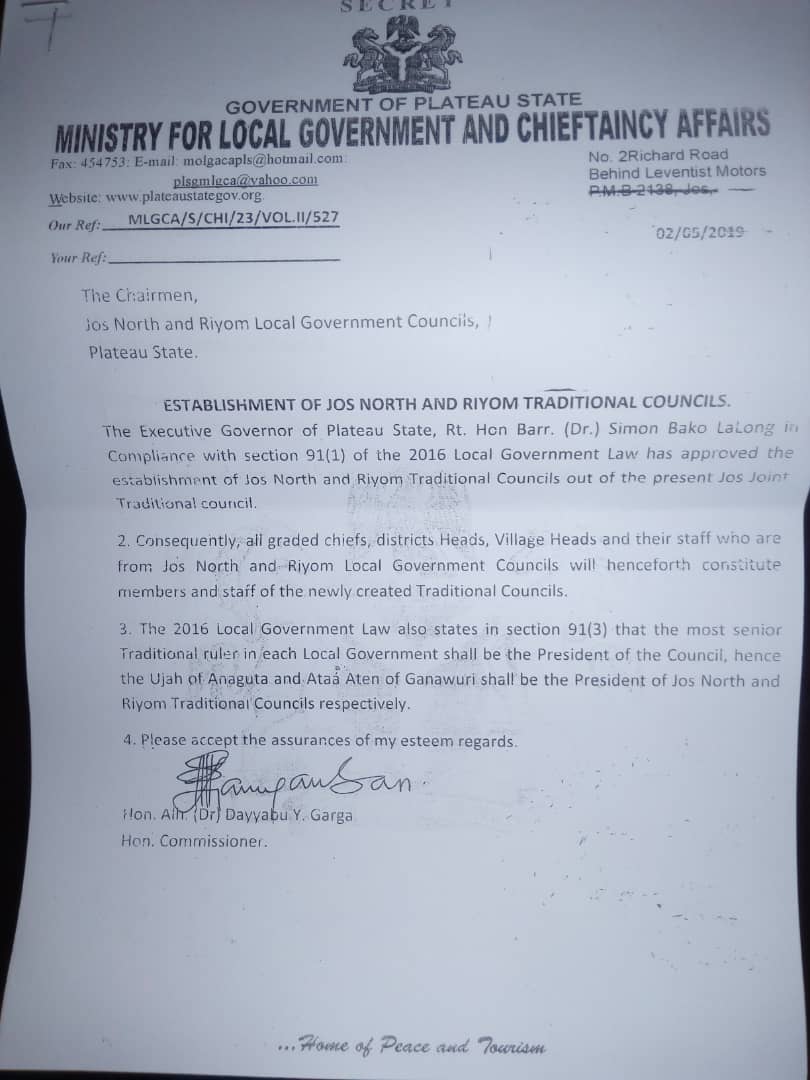Is there any guarantee that one governor or the other in Northern Nigeria might not trigger violence by a new attitude of fiddling with the traditional authority architecture in their domain? What started with breaking up Kano Emirate appears to have arrived Jos, Plateau State where the Joint Jos Traditional Council, (JJTC) has been split into two – Jos North and Riyom traditional councils. The split in a sudden memo is totally open to variegated interpretations and counter interpretations that could spell trouble in a deeply divided polity.
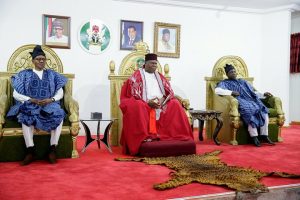
Gov Lalong & President Buhari at the palace of the Gbong Gwom Jos
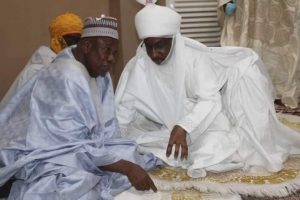
Governor Ganduje with Emir of Kano
The contrasts between the case in Kano and Jos are quite stark. While the exercise in Kano has stirred the hornet’s nest to the paradoxical point of radical activists rolling their intellectual and advocacy sleeves up in defence of aristocracy, that of Jos is exactly the opposite. In fact, so far, a dominant narrative is emerging that the breaking up of JJTC is heralding an Emir of Jos. At a time of very tense inter-group relations, an exercise such as the splitting of the council can serve as ammunition for any manner of conflict. Not when even the exercise in Kano where there is no similar question as “Who Owns Jos” has been spared its own identity affirmations and disavowal as in Wudil rejecting Gaya Emirate. Anything done to avoid deepening of senses of difference around Jos would have been more preferable at a time such as this.
So interesting so far is the emerging very categorical interrogation of the power of governors to create new kingdoms as Kano and Plateau State Governments have done. The Gbong Gwom of Jos, Da Jacob Gyang said the Plateau State governor does not have the authority to redefine traditional boundaries just as civil society activists commenting on the Kano case argue that “a state legislature cannot promulgate a law that dissolves an institution that is not a product of Statute and predates Nigeria’s colonial history”. Although granting that the Government can remove Emirs, with just cause as allowed by law, the group does not accept that government can dissolve an emirate that was not created by statute but “simply recognized by law following the colonization of Nigeria”. Even the Kano Concerned Citizens Initiative, (KCCI) which spoke in a rather understandably subdued tone stated that “Government actions cannot be arbitrary” and that “there must be caution in any attempt to change over 1,000 years of tradition and there is need to carry along all the key stakeholders if it is for the benefit of the people”.
No such collection of intellectuals has taken a collective position on the situation in Plateau yet but if and when they do, the argument is likely to be upheld. The Gbong Gwon Jos predated Nigeria’s independence and the question of whether the stool he sits upon can be casually split will always be open to debate. While debate is a welcome feature, there is no guarantee that this particular debate will be conducted in any other direction but of trouble.
Intervention has no knowledge of the intellectual status of the writer yet in terms of whether he is an authoritative Historian on Berom identity or whether as a former legislator, he has privileged information on Plateau cultural politics but Bitrus Kaze’s article is circulating fast and might soon establish itself as the jump-off point for many actors or stakeholders. With governors served by intellectually very weak publicity machinery, how might a more convincing, alternative framing of the dissolution of JJTC emerge before enemy images deepen to a point of no return? The piece in question is reproduced below:
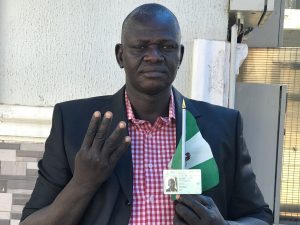
Hon. Bitrus Kaze, ex – Plateau federal lawmaker
Jos North and Riyom Traditional Council Reforms: Heralding the Emir of Jos?
On it’s face value, it looks completely harmless. Some of us may even choose to celebrate the CHANGE of title from The Gbong Gwom Jos to Gbong Gwom Berom as well as the fact that the President of Plateau State Council of Chiefs and Emirs would henceforth emerged from any of the 1st Class Chiefs/Emirs on the Plateau. However, it should be crystal clear to all discerning minds what big disaster this circular portends for the survival of Plateau ethnic nations beginning with the endangered native tribes of the Jos area.
This circular seeks to disrupt the time-tested Joint Jos/Barkin Ladi/Riyom Traditional Council but does not define in clear, unmistaken and unambiguous terms what role and status the throne of His Majesty the Gbong Gwom Jos (a creation of the law) assumes in the new order. Effectively therefore, it threatens to send the royal stool into the oblivion. Even if burrowing from the Gov Ganduje example in Kano State, it is simply unthinkable that any Member of the Plateau State cabinet by whatever name called and howsoever described would single-handedly contemplate such sweeping reforms of such conservative and very sensitive institution by merely issuing circular without first subjecting the process through the rigours of the legislative mill (in the instance, the Plateau State House of Assembly).
It’s an open secret that in his bid to secure a second tenure, Gov Lalong promised to among other things create a new district for Jasawa. However and very curiously so, this radical reform does not pretend to mention anything concerning The Sarki or Emir of Jos. We all know that the creation of an Emir of Jos is what the Jasawas have ultimately craved for in a long period of time and they believe that the best time for them to strike is now that President Buhari, Gov Lalong and APC Next Level are holding the reins of power.
It must be made abundantly clear that the dream to send the Gbong Gwom Jos into obscurity from Jos city is a joke taken too far. It is not really meant to serve the purpose of either the Afizeres or Anagatuas as it cunningly appears in the circular, it is simply a decoy designed to create division and acrimony amongst our people to prepare the way for achieving an age-long dream conceived since the Usman Dan Fodio jihadic exploits. Within the scheme of things in the modern day Nigeria, in the whole of the geographical area formerly known as the Jos Native Authority, the Berom ethnic nation stands out as the strongest, most organized, most influential, most portent and therefore most feared. Should the Hausa-Fulani oligarchy succeed in frustrating the Beroms out of Jos the Plateau State capital, definitely the Afizeres and the Anagutas would be effectively dislodged with much ease to pave way for the enthronement of an Emir in Jos.
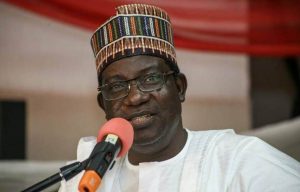
Gov Lalong
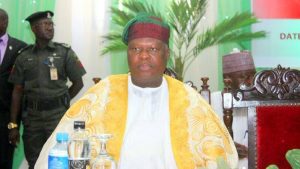
Speculated to be the target
For me, the trio of Berom, Afizere and Anaguta cousins may continue in their local bickering among themselves, but no matter how bitter their disagreements our own Plateau State government MUST NOT become a tool in the hands of our traducers to decimate our people from their ancestral land under the guise of reforms or indeed whatever guise. Assuming this circular actually emerged from the Gov Lalong-led state government, it undoubtedly portends great disaster because it initiates a process of dashing to the Hausa-Fulani oligarchy a prize their fore-bearers failed to secure through desperate jihadic wars or what is now the modern day Maitatsine, Boko Haram or herdsmen killings.
Surprisingly it does appear to me as if not too many Plateau natives being sympathetic to the APC are able to see this deadly reality. This dangerous circular may serve the purpose of the APC momentarily but it surely endangers our corporate future as a people and that of our generations yet unborn”. End of Kaze’s article.
This is an interpretation that will sell to a large audience in Nigeria today. So, what experiments might governors be conducting with the traditional authority in the states at a time most of them are so weak in legitimacy, in terms of well rooted parties and in terms of good, democratic governance that their critics can easily make mincemeat of them? What is the agenda warranting this seeming revised ‘divide and rule’ tactic? Is this a case of the strategy of resorting to creating a diversion when leaders are unpopular? Whatever it is they want to achieve, can they manage it without creating more problems for an already deeply divided society? A society where, as Yakubu Dogara, Speaker, House of Representatives put it last week, there are areas in which nothing symbolizing government can be found anymore: “Police stations are gone. Roads, buildings, hospitals and schools have all been destroyed”. This forced him to pose the question: “How long it is going to take us before we even get back to the position where we were prior to the breakout of violence?”
The world is waiting for that political sociologist who would explain this surprising turn to traditional rulers to a point where this could be said to be traditional rulers’ moment in Nigeria. Traditional rulers have become so popular that radicals are even on their side, something suggestive of how unpopular the politicians have become. It is a complete reversal of the situation in the Second Republic.

